Hyundai Tucson vs VW Touran - Differences and prices compared
Compare performance (288 HP vs 150 HP), boot space and price (20900 £ vs 36000 £ ) at a glance. Find out which car is the better choice for you – Hyundai Tucson or VW Touran?
Costs and Efficiency:
Price and efficiency are key factors when choosing a car – and this is often where the real differences emerge.
Hyundai Tucson has a decisively advantage in terms of price – it starts at 20900 £ , while the VW Touran costs 36000 £ . That’s a price difference of around 15098 £.
Fuel consumption also shows a difference: Hyundai Tucson manages with 2.70 L and is therefore convincingly more efficient than the VW Touran with 5.20 L. The difference is about 2.50 L per 100 km.
Engine and Performance:
Power, torque and acceleration are the classic benchmarks for car enthusiasts – and here, some clear differences start to show.
When it comes to engine power, the Hyundai Tucson has a convincingly edge – offering 288 HP compared to 150 HP. That’s roughly 138 HP more horsepower.
In acceleration from 0 to 100 km/h, the Hyundai Tucson is to a small extent quicker – completing the sprint in 7.50 s, while the VW Touran takes 8.90 s. That’s about 1.40 s faster.
There’s also a difference in torque: Hyundai Tucson pulls minimal stronger with 379 Nm compared to 360 Nm. That’s about 19 Nm difference.
Space and Everyday Use:
Beyond pure performance, interior space and usability matter most in daily life. This is where you see which car is more practical and versatile.
Both vehicles offer seating for 5 people.
In curb weight, VW Touran is barely noticeable lighter – 1520 kg compared to 1542 kg. The difference is around 22 kg.
In terms of boot space, the VW Touran offers evident more room – 834 L compared to 620 L. That’s a difference of about 214 L.
When it comes to payload, VW Touran slight takes the win – 601 kg compared to 545 kg. That’s a difference of about 56 kg.
Who wins the race in the data check?
The Hyundai Tucson is decisively ahead in the objective data comparison.
This result only shows which model scores more points on paper – not which of the two cars feels right for you.
Costs and Consumption
View detailed analysis
Engine and Performance
View detailed analysis
Dimensions and Body
View detailed analysis

Hyundai Tucson
Hyundai Tucson
Hyundai Tucson marries bold, sculpted looks with a clever, roomy cabin that feels smarter than its price tag suggests. It's composed on the road, easy to live with day-to-day, and a sensible choice for buyers who want SUV style without the showroom theatrics.
details




VW Touran
The VW Touran is a sensible family people‑carrier that mixes practical packaging with tidy, German-built refinement, making everyday life with kids and shopping feel a lot less chaotic. If you want a reliable, no-nonsense companion that drives with surprising poise and values usefulness over flash, the Touran is a very persuasive choice.
details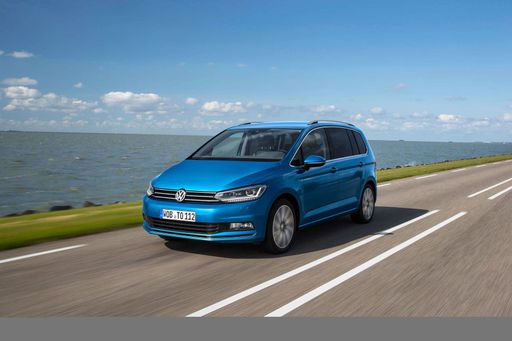
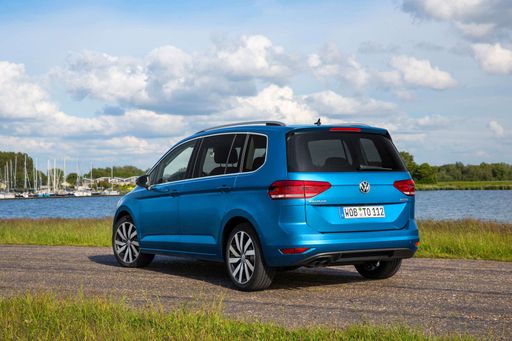
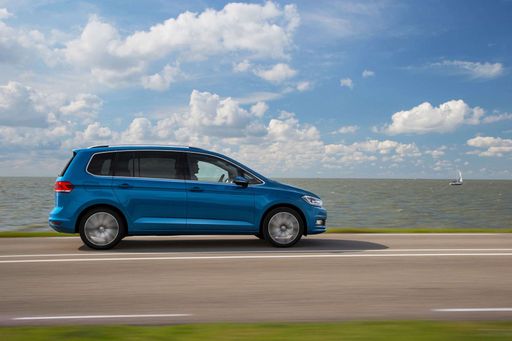
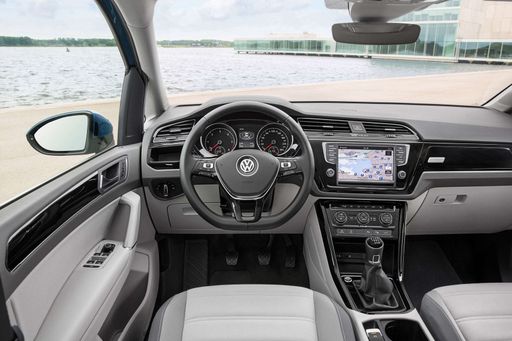
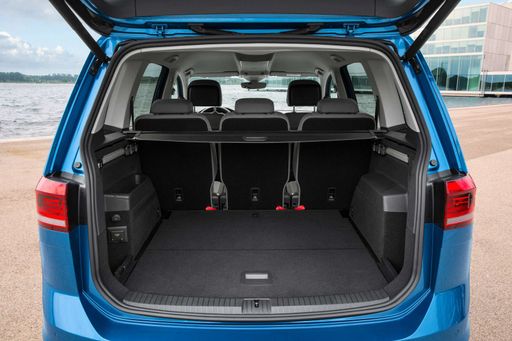
Costs and Consumption |
|
|---|---|
|
Price
20900 - 47900 £
|
Price
36000 - 45300 £
|
|
Consumption L/100km
2.7 - 7.6 L
|
Consumption L/100km
5.2 - 6.5 L
|
|
Consumption kWh/100km
-
|
Consumption kWh/100km
-
|
|
Electric Range
63 - 70 km
|
Electric Range
-
|
|
Battery Capacity
-
|
Battery Capacity
-
|
|
co2
62 - 172 g/km
|
co2
136 - 149 g/km
|
|
Fuel tank capacity
52 - 54 L
|
Fuel tank capacity
-
|
Dimensions and Body |
|
|---|---|
|
Body Type
SUV
|
Body Type
MPV
|
|
Seats
5
|
Seats
5
|
|
Doors
5
|
Doors
-
|
|
Curb weight
1542 - 1893 kg
|
Curb weight
1520 - 1631 kg
|
|
Trunk capacity
546 - 620 L
|
Trunk capacity
834 L
|
|
Length
4525 - 4535 mm
|
Length
-
|
|
Width
1865 mm
|
Width
1829 mm
|
|
Height
1650 mm
|
Height
-
|
|
Max trunk capacity
1795 - 1799 L
|
Max trunk capacity
-
|
|
Payload
518 - 545 kg
|
Payload
590 - 601 kg
|
Engine and Performance |
|
|---|---|
|
Engine Type
Petrol, Full Hybrid, Plugin Hybrid, Diesel MHEV
|
Engine Type
Petrol, Diesel
|
|
Transmission
Manuel, Automatic
|
Transmission
Manuel, Automatic
|
|
Transmission Detail
Manual Gearbox, Dual-Clutch Automatic, Automatic Gearbox
|
Transmission Detail
Manual Gearbox, Dual-Clutch Automatic
|
|
Drive Type
Front-Wheel Drive, All-Wheel Drive
|
Drive Type
Front-Wheel Drive
|
|
Power HP
136 - 288 HP
|
Power HP
122 - 150 HP
|
|
Acceleration 0-100km/h
7.5 - 11.6 s
|
Acceleration 0-100km/h
8.9 - 10.8 s
|
|
Max Speed
196 - 204 km/h
|
Max Speed
-
|
|
Torque
250 - 379 Nm
|
Torque
250 - 360 Nm
|
|
Number of Cylinders
4
|
Number of Cylinders
4
|
|
Power kW
100 - 212 kW
|
Power kW
90 - 110 kW
|
|
Engine capacity
1598 cm3
|
Engine capacity
1498 - 1968 cm3
|
General |
|
|---|---|
|
Model Year
2025
|
Model Year
2024 - 2025
|
|
CO2 Efficiency Class
F, D, E, B
|
CO2 Efficiency Class
E
|
|
Brand
Hyundai
|
Brand
VW
|
What drive types are available for the Hyundai Tucson?
Available configurations include Front-Wheel Drive or All-Wheel Drive.




